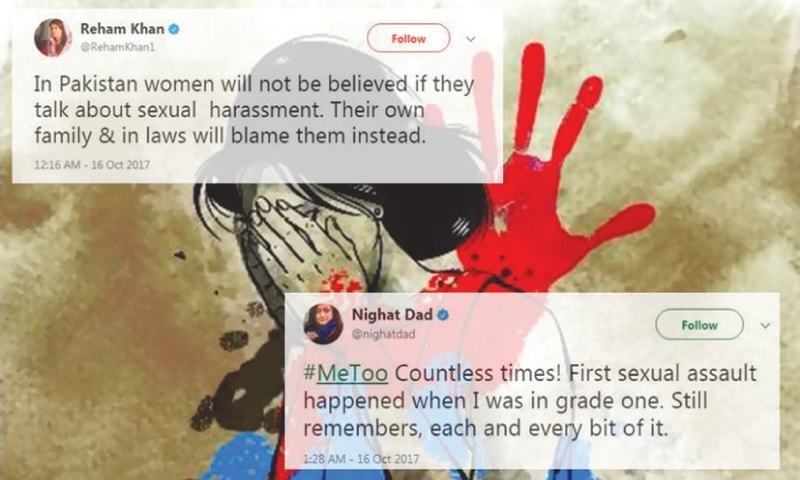Popular Reads
Top Results
Can't find what you're looking for?
View all search resultsPopular Reads
Top Results
Can't find what you're looking for?
View all search resultsPakistani women use hashtag to expose scale of sexual abuse
Pakistani women join the #MeToo movement in social media to voice their concern over sexual abuse.
Change text size
Gift Premium Articles
to Anyone
T
housands of women across the world, including Pakistan, have put up a brave front against sexual assault and workplace harassment in a monumental precedent set by a powerful hashtag on social media.
The hashtag, “MeToo”, translated into a viral movement on Tuesday as an increasing number of posts started to appear on Twitter, Facebook and Instagram, after Hollywood actress Alyssa Milano posted a screenshot on Twitter calling upon women to speak up “If you’ve been sexually harassed or assaulted write ‘me too’ as a reply to this tweet”.
The movement comes days after Hollywood producer Harvey Weinstein was accused of rape and sexual assault by a number of A-list actresses.
Unlike previous instances when campaigns against sexual assault had little impact in Pakistan, the “MeToo” lobby gained an alarmingly high traction in the country. Women from all walks of life took to social media to admit they had suffered too.
Nighat Dad, a lawyer and digital rights activist, tweeted, “#MeToo Countless times! First sexual assault happened when I was in grade one. Still remembers, each and every bit of it.”
In a societal set-up where women are faced with harsh criticism for having experienced instances of unwanted sexual advances, the movement has, in fact, brought out the magnitude and universality of the matter.
Journalist Reham Khan regretted the country’s treatment of harassment discourse in a tweet on her official account: “In Pakistan women will not be believed if they talk about sexual harassment. Their own family & in-laws will blame them instead.”
In recent years, efforts against sexual harassment culminated in the enactment of the landmark Protection Against Harassment of Women at Workplace Act, 2010 but given the cultural barriers that restrict harassment discourse, victims have remained tight-lipped for too long.
Echoing the distress of having remained voiceless despite being a victim, Lahore-based actress Nadia Jamil joined the movement and tweeted on her official account: “I was too young when it first happened. It went on too long. Too much anger. Too much violence. Too much hurt. Too much silence. So over. #MeToo.”
Journalist Rabia Mehmood expressed similar views in her contribution to the online movement: “#MeToo. As a child and as an adult. Took me hours and whatsapp/fb chat reassurances from friends to be able to post this. Still not easy.”
The hashtag, which was among the top trends on Twitter for three consecutive days, also saw widespread outrage on other social media platforms.
“If all the women who have been sexually harassed or assaulted wrote “Me too” as a status, we might give people a sense of the magnitude of the problem. My timeline is already full of people who shared this,” classical dancer and women rights activist Sheema Kermani posted on her Facebook page.
Although it is too early to assess whether the online movement would yield a permanent solution to the grave issue, women have embraced MeToo as a ‘monumental’ slap on their assaulter’s [feeds].
This article appeared on the Dawn newspaper website, which is a member of Asia News Network and a media partner of The Jakarta Post










